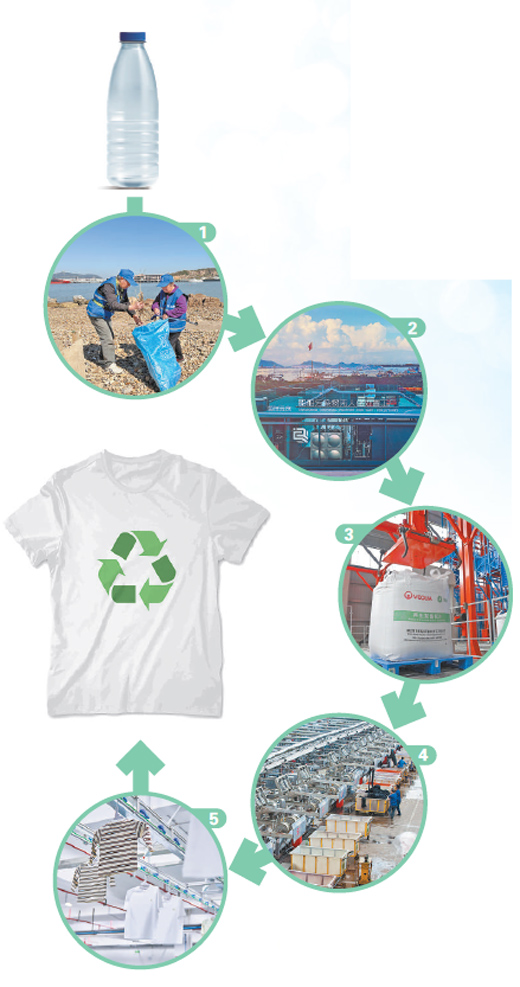Recently, a resident surnamed Yu in Hangzhou, capital of east China's Zhejiang Province, was intrigued by a T-shirt advertised online as being made from "fabric derived from marine plastic waste."
After inquiring with customer service, Yu learned that the polyester fibers used in the T-shirt's fabric came from plastic waste collected along Zhejiang's coastline. This material was then blended with cotton to produce recycled yarn, making the product both environmentally friendly and energy-efficient.
"It's meaningful that a simple T-shirt can contribute to environmental protection," Yu remarked as he placed an order.
The T-shirt is the result of the Blue Circle environmental initiative, a marine plastic waste program launched in Zhejiang, which was honored with the 2023 Champions of the Earth Award - the United Nations' most prestigious environmental recognition - on Oct. 30, 2023. The program aims to tackle the challenges of collecting, processing, and recycling ocean plastic waste, and ensures that the recycled plastics are turned into products.

① : Staff members of a collection and storage site for marine debris called Xiaolan Zhijia, which literally means little blue house, in Jiaojiang district, Taizhou city, east China's Zhejiang Province. (Photo courtesy of VisionBlue)
② : Photo shows the unmanned disposal factory for ship pollutants of the "Ocean Cloud Warehouse" in Jiaojiang district, Taizhou city, east China's Zhejiang Province. (Photo courtesy of the publicity department of the Communist Party of China Jiaojiang district committee)
③ : Photo shows a scene in the plant of Veolia Huafei Polymer Technology (Zhejiang) Co., Ltd. in east China's Zhejiang Province. (Photo/Cui Jili)
④ : Photo shows a scene in the plant of Hangzhou Xinsheng Printing and Dyeing Co., Ltd. in east China's Zhejiang Province. (Photo/Fu Xiaoling)
⑤ : Photo shows a scene of a clothing manufacturer in Jiangbei district, Ningbo city, east China's Zhejiang Province. (Photo/Chen Ke)
Public participation in recycling
In the early morning, a crowd gathered with bags of garbage at a collection and storage site for marine debris called Xiaolan Zhijia, which literally means little blue house, at Waisha Road in Jiaojiang district, Taizhou city, Zhejiang. "I collected a large bag of plastic waste by the seaside," said Chen Xiafang, a 71-year-old resident.
Ruan Ningning, a worker at the site, retrieved the recorder from Chen's vest to verify the collection route on its screen. "We use video recorders to ensure the waste is collected within 1 kilometer of Jiaojiang district's coastline," Ruan said.
After weighing, the site purchased Chen's marine waste at 4 yuan ($0.55) per kilogram, much higher than the market price, Ruan said.
There are about 50 registered collectors of marine debris like Chen for the site at Waisha Road. According to Ruan, those who collect marine debris consistently for six months are provided insurance by Zhejiang-based technology company VisionBlue, which operates the site. The higher purchase prices and prompt payments have resulted in wide public participation in the program.
Near Jiaojiang Bridge, the facility "Ocean Cloud Warehouse" processes the debris collected for transport. Chen Hui, operation and maintenance director of VisionBlue, said marine plastic waste, including plastic bottles, used fishing nets, and buoys, undergoes compression at the warehouse before being transported to recycling factories, where the waste is reshaped into plastic particles.
"The pre-processing reduces the volume of plastic waste, such as plastic bottles, by 90 percent in the warehouse and improves transport efficiency by 70 percent," Chen said. The processed materials are then sent to member companies of a non-profit organization called the "Blue Alliance," which is led by VisionBlue, for further treatment.
Processing the plastics
At 9 a.m., a truck loaded with ocean-recycled plastic bottles entered the factory of Veolia Huafei Polymer Technology (Zhejiang) Co., Ltd., located in Anji county in Huzhou city, Zhejiang.
The company is one of the founders of the "Blue Cycle" program. According to Fu Xianwei, the company's operations director, the company, as part of the "Blue Cycle" program, is responsible for cleaning and melting the recycled plastics.
Fu said these plastics are stamped with a unique QR code that can trace the entire collection process of the plastic bottles.
The company puts the recycled marine plastic through a thorough, entirely automated process, cleaning and turning the bottles into high-precision plastic particles which can be used in the creation of new products.
It has so far processed about 10 million plastic bottles collected from the ocean.
Creating something new
Hangzhou Xinsheng Printing and Dyeing Co., Ltd., also a member of the "Blue Alliance," has built a production line to transform marine plastic particles, including those processed by Veolia Huafei Polymer Technology (Zhejiang) Co., Ltd., into various fabrics.
"These fabrics made from marine plastic are no inferior to other recycled fabrics in terms of quality and performance, and they are highly sought after in the international market," said Fu Xiaoling, marketing director of the company.
These fabrics are then sent to a clothing manufacturer in Jiangbei district, Ningbo city, Zhejiang to make clothes. The company employs third-party testing for shrinkage, formaldehyde levels, and pH values to ensure quality, said Hou Biao, the company's supply chain director.
The company launched a T-shirt with marine plastic waste as one of the materials in May of this year. Despite being a relatively new product, it has been praised and highly sought after, said Zhang Yong, founder of the company.
Although the production costs of such an eco-friendly T-shirt are at least 10 percent higher, Zhang sees value beyond profits. "I grew up by the sea and felt heartbroken and anxious seeing the coastline being eroded by plastic waste," Zhang said.
Zhang emphasizes the importance of verifying that the fabrics actually come from marine plastic waste, a concern addressed by the visual traceability system in upstream links.
Zhang plans to develop additional types of eco-friendly clothing, as he believes that only by having more companies participate and continuously experiment to protect the ecological environment can people jointly safeguard the blue planet.

